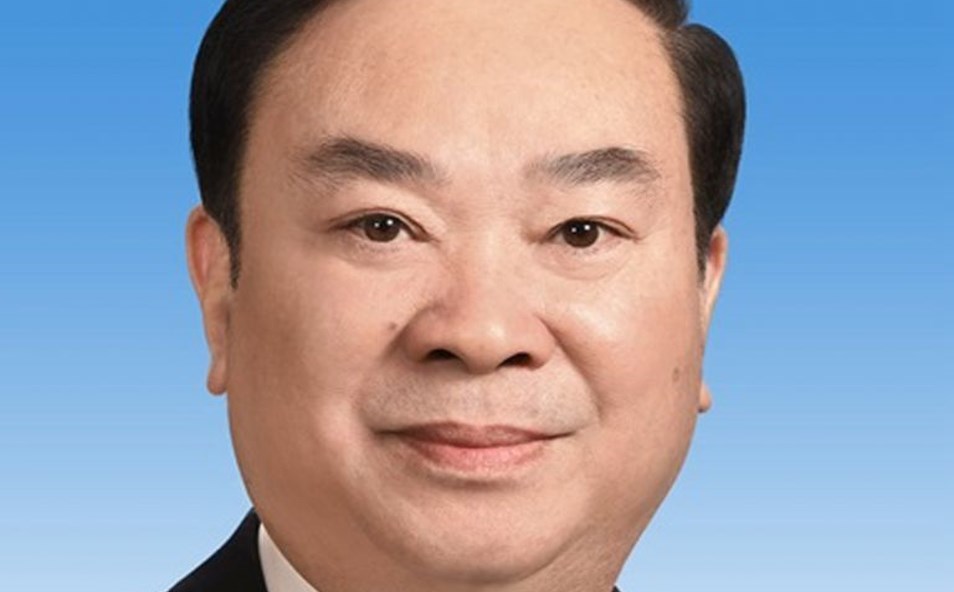Hong Kong media boss Siu Sai-wo has said he “did not misquote” China’s propaganda chief Huang Kunming as saying that Hong Kong’s news organisations should not “become a base for interfering with mainland politics.”
Siu, the head of the Sing Tao News Corporation, was asked to clarify the Chinese official’s words after the newspaper’s report on Huang’s comments diverged with the executive’s own account. Siu declined to clarify the original wording when speaking to reporters on Thursday, but denied that he had misquoted Huang.
Siu was one of 20 Hong Kong media executives who travelled to Beijing to meet with Huang. After the meeting on Tuesday, Siu was asked about the Foreign Correspondents’ Club and its controversial decision to host a talk by independence advocate Andy Chan.

According to news clips uploaded online, Siu said: “[Huang] mentioned that [he] hoped Hong Kong media would not become a base for interfering with mainland politics.”
Asked by reporters to elaborate, Siu quoted Huang as repeatedly saying that Hong Kong operates under One Country, Two Systems and that “two systems” must be based on “one country.”
“Under this premise, [Huang] hoped that Hong Kong’s media would not make Hong Kong a base for interfering with mainland politics,” he added.
On Tuesday, multiple news outlets had reportedly deleted or amended their reports of Siu’s comment, including Commercial Radio, the Hong Kong Economic Journal and the Hong Kong Economic Times’s online platform TOPick.

Both Apple Daily and Oriental Daily cited sources as saying that officials from the China Liaison Office in Hong Kong had ordered media organisations to delete the report on Siu, or amend it so that it had a different focus.
Divergent statements
The day after meeting with Huang, Siu said in a statement that, after his meeting with Huang on Tuesday, he took questions from reporters and later gave out a written version of his responses.
Siu said he hoped the two versions had “basically the same” meaning, but the written form should be preferred in case of discrepancy.

Siu’s written statement is not available to the public, but Sing Tao Daily reported that Huang’s comment to media executives was: “under one country two systems, [we] must prevent external forces from turning Hong Kong into a base for interfering with the mainland.”
Siu also dismissed concerns of Beijing influence on Hong Kong media.
“This trip [to Beijing] was a normal exchange activity – I hope the public will not engage in unnecessary speculation,” Siu said.
The Hong Kong Journalists Association said on Wednesday that the incident was highly unusual, and added that it received questions from its members asking whether it is a case of “self-censorship or external pressure on Hong Kong media.”
“The public have reasons to believe those reports are true, based on facts. But some media outlets have later retracted their reports. The public will feel bewildered. They fear media were practising self-censorship,” the HKJA added.
”HKJA’s full statement”
A Hong Kong senior media delegation held a meeting with Huang Kunming, head of the Chinese Communist Party’s Propaganda Department during their visit to Beijing on Tuesday. At a post-meeting media briefing broadcast on live, delegation leader Siu Sai-wo, flanked by some delegates, quoted Huang as saying he hoped that “Hong Kong media should not become a political base for interfering with the mainland.” Some media outlets had reported his remarks, both in the text and headlines of their reports. Delegates who were also present at the briefing did not refute Siu’s remarks.
Some media outlets, which were represented in the delegation, have later changed their original reports; they deleted Siu’s reference relating to “a political case for interfering with the mainland”. Some media have deleted the television footages of the media briefing from their website. Quoting sources, some media reported that media organisations have received reminders from the Propaganda Department, saying that Huang’s remarks were aimed for internal discussion, not reporting.
We hold the view that the incident is highly unusual. We have also received queries made by fellow journalists. They are concerned about whether it is a case of self-censorship or external pressure on Hong Kong media.
We urge Mr Siu Sai-wo to clarify whether what he said at the media briefing is true and, if not, what the original words are. And if there are discrepancies in his quotes, whether he will retract his remarks.
We urge media delegate to clarify what Siu said is true and, if not, what the original words are.
We urge the Propaganda Department to clarify whether Siu’s quotes are correct and, if not, what the original words are?
We urge those media outlets who have deleted their reports to clarify whether they have done so because of pressure from Beijing – as some media have said.
We would like to reiterate we have no intention of interfering with the editorial independence of media organisations. But what Mr Siu has said has already been broadcast on live and that the relevant media reports have been published. The public have reasons to believe those reports are true, based on facts. But some media outlets have later retracted their reports. The public will feel bewildered. They fear media were practising self-censorship. We sincerely hope the senior media delegation will clear the air to dispel public doubts and anxieties.
